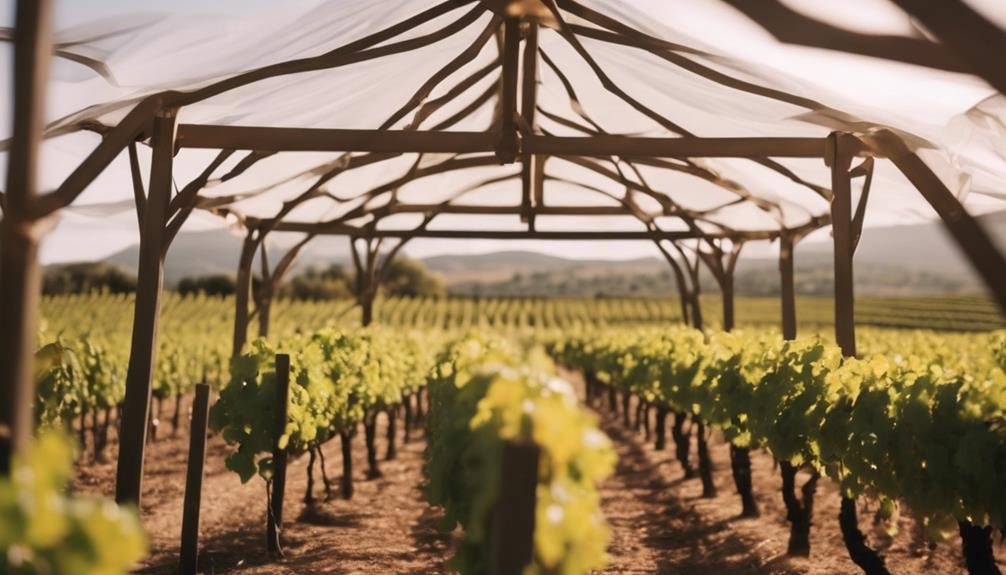Climate change is jeopardizing wine regions globally, with rising temperatures and erratic weather patterns causing significant impacts. These changes are disrupting growing conditions and altering grape quality. Vineyards face challenges such as water scarcity and heat stress, necessitating innovative strategies like drip irrigation and shading techniques. Successful adaptation in regions like Chile and Portugal involves embracing dry farming and conservation practices. Behavior adjustments, including sustainable farming and promoting biodiversity, enhance vineyard resilience. Renowned expert Madeline Puckette emphasizes the need for education and sustainability in the wine industry. Learn more about climate change's effects on vineyards and proactive measures to mitigate risks.
Impact of Climate Change on Wine Regions
The escalating impact of climate change on wine regions globally is becoming increasingly evident, with rising temperatures and erratic weather patterns posing significant challenges to vineyards and grape production.
Grape varieties are facing shifts in key growing conditions, leading to potential changes in flavor profiles and overall grape quality. Soil health is also a concern, as extreme temperatures and changing precipitation patterns can impact the fertility and composition of soils essential for vine growth.
Adapting to these changes may involve exploring new grape varieties better suited to the evolving climate conditions and implementing sustainable soil management practices to maintain the health and productivity of vineyards.
Addressing these challenges is vital to ensure the long-term viability and sustainability of wine production in the face of climate change pressures.
Challenges Faced by Vineyards
As vineyards confront the escalating impacts of climate change, they are encountering a myriad of challenges that threaten the stability and productivity of wine production. Water scarcity poses a significant threat, necessitating vineyard resilience through innovative irrigation strategies and conservation measures.
Heat stress is another critical issue affecting grape production, with rising temperatures altering growing conditions and harvest timings. Vineyards must adapt to these changing climates by implementing shading techniques and adjusting planting schedules.
Balancing these challenges while maintaining grape quality and quantity requires a delicate and proactive approach from vineyard managers. Developing sustainable practices and investing in research to enhance vineyard resilience against climate change effects are essential steps in safeguarding the future of wine production.
Successful Adaptation Strategies

In light of the escalating impacts of climate change on vineyards, implementing successful adaptation strategies is essential for ensuring the future sustainability of wine production. Water conservation plays a pivotal role in mitigating the effects of climate change on vineyards. By employing sustainable practices such as drip irrigation systems and mulching techniques, vineyards can reduce water usage while maintaining grape quality.
Embracing techniques like dry farming, as seen in regions like Chile and Portugal, has shown positive results in producing fine concentrated wines while reducing water consumption. These adaptation strategies not only help in conserving water resources but also contribute to the overall resilience of vineyards in the face of changing climatic conditions.
Importance of Behavior Adjustment
Behavior adjustment plays a crucial role in mitigating the adverse impacts of climate change on vineyards and ensuring the long-term sustainability of wine production. By modifying behaviors and practices, individuals can enhance climate resilience and protect wine regions from significant harm.
- Implementing Sustainable Farming Techniques:
Adopting eco-friendly practices can reduce the carbon footprint and enhance the overall health of vineyards.
- Conserving Water Resources:
Efficient water management strategies can help vineyards cope with drought conditions and guarantee an adequate water supply for grape cultivation.
- Promoting Biodiversity:
Encouraging diverse plant and animal species in vineyard ecosystems can increase resilience to climate change impacts.
- Educating Stakeholders:
Providing knowledge and resources on climate-smart practices can promote a collective effort towards sustainable wine production.
Insights From Wine Industry Expert

Renowned wine industry expert Madeline Puckette shares invaluable insights into the evolving landscape of climate change's impact on wine regions. Puckette emphasizes the importance of wine education in understanding the challenges faced by the industry. She advocates for sustainability practices to safeguard the effects of climate change on vineyards and winemaking. Through her platform, Wine Folly, Puckette promotes a deeper appreciation for wine while educating consumers on the intricate relationship between environmental sustainability and wine production. Her expertise highlights the need for proactive measures within the industry to guarantee the longevity and quality of wine regions worldwide.
| Insights from Madeline Puckette | ||
|---|---|---|
| Wine education | Sustainability practices | Climate change impact |
Frequently Asked Questions
How Can Consumer Behavior Influence the Future of Wine Regions?
Consumer awareness plays a pivotal role in shaping the future of wine regions. By embracing sustainable practices and making informed choices, consumers can influence vineyard management, production techniques, and environmental conservation efforts for a thriving wine industry.
What Are Some Innovative Strategies for Combating Climate Change in Vineyards?
Innovative sustainable practices in viticulture play a critical role in combating climate change in vineyards. By focusing on reducing the carbon footprint and implementing adaptation strategies, the wine industry can adapt to the evolving environmental challenges.
Can Changes in Farming Techniques Mitigate the Impacts of Climate Change on Wine Production?
Changes in farming techniques, such as implementing sustainable practices and adaptation strategies, can help mitigate the impacts of climate change on wine production. By adopting these approaches, vineyards can better prepare for and withstand environmental challenges.
What Role Does Education Play in Preparing Vineyards for Climate Change?
Education is paramount in preparing vineyards for climate change. Understanding adaptation strategies, such as implementing sustainable practices and innovative technologies, is essential. Educated vineyard owners and farmers can proactively protect their vineyards and guarantee long-term sustainability.
How Can the Wine Industry Collaborate to Address Climate Change Challenges?
The wine industry can address climate change challenges through industry partnerships and sustainability initiatives. Cross-sector collaboration and research innovation are crucial. By collectively implementing strategies to mitigate climate change effects, the industry can safeguard vineyards and guarantee sustainable wine production.
Conclusion
To sum up, the intersection of climate change and wine regions presents both challenges and opportunities for the industry. As vineyards around the world adapt to changing environmental conditions, innovative strategies are emerging to mitigate the impact of rising temperatures and shifting weather patterns.
By collectively addressing these challenges and embracing sustainable practices, the wine industry can navigate this new reality and continue to thrive in the face of adversity. Adaptation is key, and the future of wine production depends on proactive measures to combat climate change.